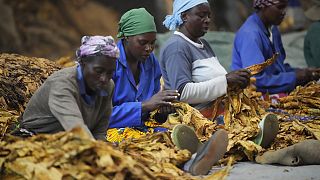World No Tobacco Day
Tobacco farming is booming in some African countries. Big producers include Zimbabwe and Malawi. However, as the world marks on May 31st the "No tobacco day", the world health organization sounded the alarm on the increase in tobacco farming land at the expense of food crops.
Zimbabwe is Africa’s largest tobacco producer.
The size of the tobacco crop increased despite increased fertiliser prices caused by the war in Ukraine, Zimbabwean officials say.
"There are more than 350 million people having hunger and food insecurity issues, and many of the countries where these issues are a concern are also big tobacco growing economies. In Africa, for example, in the last 15 years. The growing of tobacco has gone up by nearly 20%," Dr. Vinayak Mohan Prasad Programme Manager, Tobacco Control, WHO Senior Advisor Focus said.
The number of people facing acute food insecurity rose to 258 million in 58 countries in 2022, according to the latest Global Report on Food Crises (GRFC).
Dr. Prasad says that food insecurity is growing in countries that should be able to feed their own people.
"There are countries now which are requesting for food because of the various crises. The access to food is limited and many of these countries are well endowed with enough land - fertile land, water to grow food for many other countries. And so it's ironic that they are ending up importing food from other countries."
Industrial tactics'
Currently, China funds the bulk of production and buys the lion’s share of Zimbabwe’s tobacco.
Once harvested, tobacco leaves are dried and prepared and will go on to make products such as cigarettes, cigars, chewing tobacco and pipe tobacco.
"The largest growers of tobacco continue to be China, India, Brazil. But growing of tobacco has increased many fold in Africa in the last couple of years. Big ones are Malawi, Zimbabwe, Tanzania, Zambia and to some extent Uganda, Kenya and other eastern African countries. And then on the western side is Cote d'Ivoire, which is also a big grower of tobacco. Down south is Mozambique. And some tobacco plants are grown in Angola and South Africa. So, it's nearly 124 countries in the world that grow some form of tobacco," explains the Programme Manager, Tobacco Control, WHO Senior Advisor Focus.
The southern African country now wants to make its tobacco industry more lucrative by manufacturing more cigarettes at home and limiting foreign funding of farmers.
Despite the financial gains, the WHO Senior Advisor called out the industry's influence, denouncing the effects of tobacco growing.
"The industrial tactics, tobacco industry tactics to push tobacco farming as economically viable, most profitable crop. And then leading to countries providing millions of dollars of subsidies; to promote tobacco. So, the farmer gets into a poverty trap after some time. The government is into subsidies and the onus understanding is that these crops are good for the economy", Vinayak Mohan Prasad said.
According to a study published by Tobacco Control, a journal on tobacco research in 2021, Zimbabwean tobacco farmers, close to 60% of farmers said they were in debt. The sample involved of 381 farmers.
Rebound and spotlight
Tobacco is on a rebound in this southern African nation where production plummeted from a high of about 240 million kilograms (265,000 tons) in 1998, according to government figures, to less than 50 million kilograms (60,000 tons) a decade later following the eviction of several thousand white farmers who accounted for the majority of growers.
In recent years Zimbabwe has rapidly increased the size of its crop, regaining its spot as one of the world’s top five exporters of tobacco, peaking at 261 million kilograms (288,000 tons) in 2019.
Zimbabwe expects to harvest 230 million kilograms (254,000 tons) of the golden leaf this season, up from 212 million kilograms (234,000 tons) last year, according to officials.
At auction premium prices are paid for the “golden leaf” that is exported around the world.
"Tobacco growing leads to not only harming the environment, it leads to deforestation. 5% of deforestation is just because of tobacco growing," Prasad explains.
According to WHO, Tobacco farming causes harm to the farmers themselves.
More than 1 million child labourers are estimated to be working on tobacco farms, missing their opportunity for an education adds Prasad.
"More than 1 million children are in the farm because tobacco requires a lot of labour. Nearly 9-10 months of working on the in the field, women and children get sucked into the farms. So, all of that health effects, environmental effects and an erroneous understanding that tobacco growing is actually very remunerative it but it's not. So we want to spotlight all this," he explains.












02:17
Grannies on Friendship Bench help Zimbabweans deal with mental health issues
11:10
Will Senegal leverage oil to transform its economy? [Business Africa]
02:05
Zimbabwe: El Nino-linked drought threatens maize production
01:12
Zimbabwe frees prisoners, including those sentenced to death, in an independence day
01:12
China writes off unspecified amount of Zimbabwe interest-free loan
02:24
Zimbabweans forced to use US dollar in absence of new currency ZiG